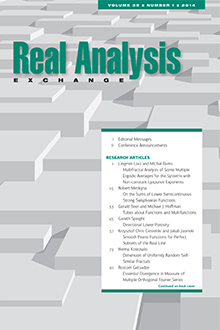Abstract
Let $f$ be an interval map defined on a neighborhood of a fixed point $0$ with \(f'(0)=\lambda\) where \(0<|\lambda|<1\) and let \(\phi_{n}(x)=f^{n}(x)/\lambda^{n}\). It is shown that if \[f(x)=\lambda x+\mathcal{O}\!\left(\frac{|x|}{y\log{(y)}\cdots \log^{p-1}{\!(y)}(\log^{p}(y))^{1+\varepsilon}}\right)\] for some \(\varepsilon>0\) and nonnegative integer $p$ where \(y=|\!\log{(|x|)}|\), then the Koenigs' sequence \(\{\phi_{n}\}\) of $f$ converges uniformly on a neighborhood of $0$ to a limit \(\phi\) with \(\phi(0)=0\) and \(\phi'(0)=1\). On the other hand, if $f(0)=0$ and \[f(x)=x\!\left(\!\lambda -\frac{1}{\log(x)\log(-\log(x)) \cdots\log^{p}{(-\log(x))}}\right)\] for sufficiently small $x>0$ where $0<\lambda<1$ and $p$ is a nonnegative integer, then the Koenigs' sequence of $f$ diverges on a small right-neighborhood of $0$. It is illustrated by examples that when \(\varepsilon=0\) in the first equation for $f$ given above, the Koenigs' sequence of $f$ can also converge to zero on a neighborhood of $0$ or converge to a limit \(\phi\) that is nondifferentiable at $0$. It is also shown that when the Koenigs' sequence of a map $f$ converges to a limit \(\phi\) that is differentiable at $0$, then \(\phi'(0)\) is either $0$ or $1$.
Citation
D. J. Dewsnap. P. Fischer. "Convergence of Koenigs’ sequences.." Real Anal. Exchange 28 (1) 111 - 120, 2002-2003.
Information





